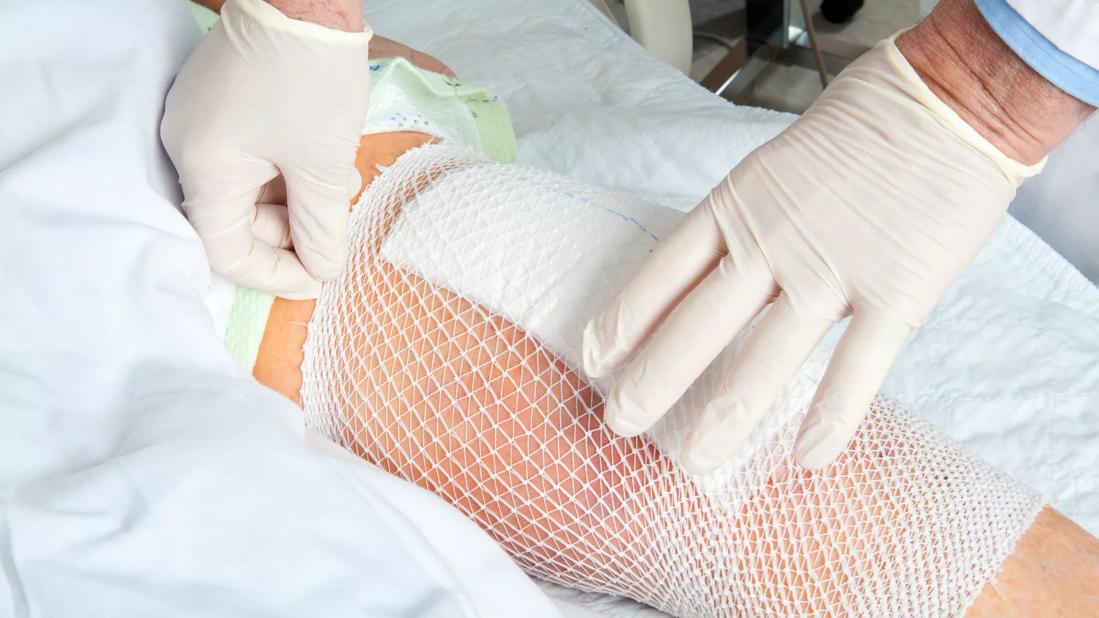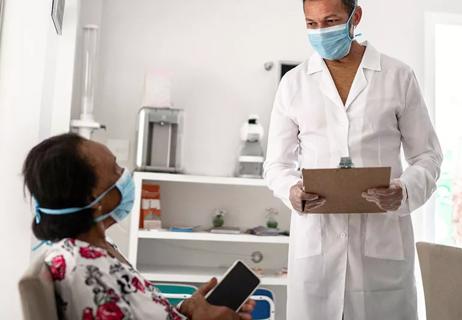Keep the area clean and monitor your incision site for discharge, odor or a change in appearance

Whether you’re having breast reconstruction surgery, knee replacement surgery or heart surgery, an infection of a surgical wound is serious business. And in some cases, an infection after surgery can be life-threatening.
Advertisement
Cleveland Clinic is a non-profit academic medical center. Advertising on our site helps support our mission. We do not endorse non-Cleveland Clinic products or services. Policy
Before and after your surgery, your healthcare team will take precautions to keep your incision area clean and free from bacteria that can lead to an infection (Staphylococcus, Streptococcus and Pseudomonas are common culprits). In most cases, your surgeon will close the site with stitches, staples or Steri-Strips and then apply a dressing over the area.
But once you’re home, what can you do to reduce your risk of an infection? And what signs or symptoms of an infection should you be looking for?
Cardiothoracic surgeon Nicholas Smedira, MD, shares the steps you can take to decrease the chances of a post-operative wound infection.
Infections after surgery are uncommon — about 1% to 3% of people develop surgical site infections (SSIs). In fact, SSIs account for 20% of all hospital-acquired infections.
SSIs can be classified into three different groups:
Dr. Smedira also says that certain individuals have a greater risk of developing an infection after surgery. Those include:
Advertisement
Once you’re home, you’ll want to monitor your incision for any signs of infection. After surgery infection signs can include:
There are things your doctor will do to help decrease the risks of post-operative wound infections. But there are also steps you can take to help yourself. Dr. Smedira recommends the following:
You have a greater risk of developing an infection if you have overweight or obesity. Your doctor may recommend getting to a weight that’s healthy for you before an elective surgery.
If you have diabetes, you’ll want to get your blood sugar well-managed as much as possible. In the weeks leading up to your surgery, monitor your blood sugars (up to four times per day), drink plenty of fluids and call your provider if your blood sugars are consistently over 250.
“The better controlled your blood sugars are before surgery, the lower your risk of developing an infection,” stresses Dr. Smedira.
And if you smoke, you should stop smoking a few days before your surgery and while your incision heals.
You may be tempted to remove any hair on, near or around the planned surgical site before your surgery.
Dr. Smedira says it’s best to leave it to the professionals. During surgery prep, your surgical team may remove the hair on your body where the surgeon will make the skin incision.
“Timing is important here,” he stresses. “The team should take care to remove the hair right before the surgeon makes the skin incision. If they remove the hair too far in advance, you can develop infections in the small cuts that occur with any hair removal.”
Advertisement
And there’s been some debate, including this meta-analysis, on whether hair removal is necessary or increases your chances of SSIs. How it’s removed can also play a role.
“Recent studies show that clippers are generally safer than razors,” Dr. Smedira continues. “Razors increase the risk of surgical site infections.”
Make sure to talk to your surgeon about hair removal and if it’s necessary, making sure to voice any concerns or questions.
An hour before surgery, your surgical team may give you a “prophylactic” or preventive antibiotic. In fact, you’ll receive antibiotics intravenously both before and after your surgery. With these steps, you’re less likely to get a wound infection.
While you may think you need antibiotics once you’re home and recovering, they’re typically not used because overuse of antibiotics can lead to resistance.
Before the surgical team discharges you from the hospital, they’ll teach you how to care for your wound. That’s critical in preventing a wound infection. You’ll receive discharge instructions, so be sure you understand them and ask questions if you don’t.
Whether you have large incisions or a minimally invasive, smaller incision, carefully monitor all of your wound sites to watch out for infection. Make sure your hands are clean when you check your wounds.
Advertisement
Always follow your care team’s instructions for bathing and showering — instructions may vary depending on how the incision was closed (staples, stitches, tissue adhesive, Steri-Strips).
While SSIs are uncommon, they can happen. And they can happen anywhere from the first few days after surgery up until the wound heals. So, you need to be vigilant about keeping the incision area clean.
Infections can spread to your bloodstream and result in septicemia and even septic shock.
“If you suspect you may have an infection after your surgery and are experiencing any symptoms like a fever and pain and notice a change in the appearance of your incision site, don’t hesitate to contact your doctor,” stresses Dr. Smedira.
Advertisement
Learn more about our editorial process.
Advertisement

Your surgeon isn’t trying to be mean — eating before surgery can raise your risk of aspirating, vomiting and more

Follow these steps to improve your outcome

Before agreeing to surgery, ask about cardiac risk

Yes, but symptoms can be easy to miss

‘Walking pneumonia’ is milder and doesn’t always require medication — but it’s also highly contagious

After knee arthroplasty, swelling-related pain is common, but infection and blood clots are also risks

Spinal blocks provide complete numbing for shorter periods, while epidurals can allow for some feeling

From washing your hands and disinfecting surfaces to boosting your immune health, there are many ways to reduce your flu risk

Wearing a scarf, adjusting your outdoor activities and following your asthma treatment plan can help limit breathing problems

Your diet in the weeks, days and hours ahead of your race can power you to the finish line

When someone guilt trips you, they’re using emotionally manipulative behavior to try to get you to act a certain way